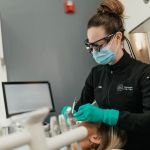Preventing Tooth Loss in Older Adults
- 1. Introduction: The Importance of Dental Care in Older Adults
- 2. Why Tooth Loss Happens in Older Adults
- 3. Key Risk Factors for Tooth Loss in Seniors
- 4. Effective Preventive Measures to Avoid Tooth Loss
- 5. Dental Care Tips for Older Adults
- 6. Diet and Lifestyle Adjustments for Healthy Teeth
- 7. When to Visit a Dentist for Preventive Dental Care
- 8. Conclusion: Prioritizing Oral Health for a Better Quality of Life
1. Introduction: The Importance of Dental Care in Older Adults
As people age, maintaining good oral health becomes more important than ever. Dental issues such as tooth loss, gum disease, and tooth decay can greatly affect the quality of life in older adults. Unfortunately, many older individuals experience tooth loss, often due to a combination of factors like natural aging processes, poor oral hygiene, and other health conditions. However, the good news is that with proper care and preventive measures, tooth loss can be minimized or even avoided altogether.
This article will explore the common causes of tooth loss in older adults, the key risk factors, and practical strategies to prevent it. By adopting effective dental care routines and making smart lifestyle choices, seniors can maintain healthy teeth and gums for longer, promoting better overall health and confidence.
2. Why Tooth Loss Happens in Older Adults
Tooth loss in older adults is often a result of a combination of factors. As we age, our teeth naturally experience wear and tear, making them more susceptible to damage and decay. Additionally, conditions like gum disease and dry mouth, which are more common in older adults, contribute significantly to the risk of tooth loss. Here are some of the key reasons why tooth loss is more common among seniors:
- Wear and Tear: Over the years, teeth endure significant stress from chewing, biting, and grinding, which can lead to weakened enamel, cracks, and ultimately tooth loss.
- Gum Disease: Gum disease, or periodontal disease, is a leading cause of tooth loss in older adults. Poor oral hygiene allows plaque to build up on teeth, leading to inflammation, infection, and eventually gum recession, which can loosen teeth.
- Dry Mouth: As people age, they may experience dry mouth due to medication side effects or other health conditions. Dry mouth reduces the amount of saliva in the mouth, which can increase the risk of cavities and gum disease.
- Chronic Health Conditions: Certain chronic health conditions, such as diabetes, can increase the risk of gum disease and tooth loss by affecting blood flow to the gums and impairing the body’s ability to fight infections.
Understanding the primary causes of tooth loss is the first step in taking preventive action. Early detection and intervention are key to preserving oral health and preventing tooth loss in older adults.
3. Key Risk Factors for Tooth Loss in Seniors
Several risk factors contribute to the increased likelihood of tooth loss as individuals age. While some of these factors are inevitable, others can be controlled or managed. The most significant risk factors for tooth loss in older adults include:
- Poor Oral Hygiene: Inadequate brushing and flossing can lead to plaque buildup, which causes cavities and gum disease. Consistent oral care is essential to prevent these issues.
- Smoking: Smoking is a major risk factor for gum disease, which can result in tooth loss. It also hinders the healing process, making it more difficult for the gums to recover from infection.
- Medications: Certain medications, particularly those used to treat high blood pressure, depression, and allergies, can cause dry mouth and increase the risk of oral health issues such as cavities and gum disease.
- Genetics: Some individuals may be genetically predisposed to certain oral health problems, such as gum disease or weaker teeth, which can increase the risk of tooth loss.
By identifying and addressing these risk factors, older adults can take proactive steps to protect their teeth and gums, reducing the risk of tooth loss as they age.
4. Effective Preventive Measures to Avoid Tooth Loss
Preventing tooth loss in older adults involves a combination of good oral hygiene, regular dental checkups, and healthy lifestyle choices. Here are several effective preventive measures:
- Brush and Floss Daily: Brushing twice a day with fluoride toothpaste and flossing daily helps remove plaque, bacteria, and food particles from the teeth and gums. This reduces the risk of cavities and gum disease, the leading causes of tooth loss.
- Use an Antibacterial Mouthwash: Rinsing with an antibacterial mouthwash can help reduce plaque buildup and prevent gum infections, further protecting the teeth and gums from decay and disease.
- Quit Smoking: Quitting smoking can significantly reduce the risk of gum disease and improve overall oral health. It’s never too late to quit, and doing so can help preserve your teeth.
- Get Regular Dental Checkups: Regular visits to the dentist for checkups and professional cleanings help catch any potential issues early. Your dentist can detect early signs of gum disease, cavities, or other oral health problems that could lead to tooth loss.
- Wear a Nightguard: If you grind your teeth at night, using a nightguard can prevent further damage to your teeth and gums. Teeth grinding can wear down teeth and contribute to tooth loss over time.
By incorporating these practices into daily life, seniors can maintain strong and healthy teeth, avoiding the common pitfalls that lead to tooth loss in older adults.
5. Dental Care Tips for Older Adults
In addition to general preventive measures, older adults can benefit from specific dental care tips to further protect their teeth and gums. These include:
- Choose the Right Toothbrush: Use a soft-bristled toothbrush to avoid damaging the gums. Opt for an electric toothbrush if you have difficulty brushing manually, as it can help ensure a thorough cleaning.
- Use Toothpaste for Sensitive Teeth: If you have sensitive teeth, using a toothpaste specifically designed for sensitive teeth can help alleviate discomfort and prevent further damage.
- Stay Hydrated: Drinking plenty of water throughout the day can help combat dry mouth and maintain healthy saliva production, which is essential for oral health.
- Consider Dental Implants: For those who have already experienced tooth loss, dental implants are a great option to restore function and aesthetics. Consult with your dentist about whether implants are right for you.
These tips, when combined with regular dental visits, can help older adults maintain a healthy mouth and minimize the risk of tooth loss.
6. Diet and Lifestyle Adjustments for Healthy Teeth
A balanced diet plays a crucial role in oral health. Certain foods and lifestyle changes can either support or hinder your ability to maintain healthy teeth as you age:
- Eat a Balanced Diet: Consuming a diet rich in calcium, vitamins D and C, and other essential nutrients supports the health of your teeth and gums. These nutrients help strengthen teeth and reduce the risk of gum disease.
- Avoid Sugary Snacks: Sugar feeds harmful bacteria in the mouth, which can contribute to cavities and gum disease. Limiting sugary snacks and beverages can protect your teeth from decay.
- Limit Alcohol Consumption: Excessive alcohol consumption can lead to dry mouth, which increases the risk of tooth decay and gum disease. Drink in moderation to protect your oral health.
By making smart diet and lifestyle choices, older adults can provide their teeth and gums with the nutrients and protection they need to stay healthy for years to come.
7. When to Visit a Dentist for Preventive Dental Care
Regular dental checkups are essential for maintaining good oral health and preventing tooth loss. If you experience symptoms such as swollen or bleeding gums, tooth sensitivity, or difficulty chewing, it’s important to visit your dentist as soon as possible. Early intervention can help prevent tooth loss and other serious dental problems.
Your dentist can perform a thorough evaluation of your oral health, offer personalized advice, and recommend treatments to address any issues you may be facing.
8. Conclusion: Prioritizing Oral Health for a Better Quality of Life
Preventing tooth loss in older adults is achievable with the right care and attention. By understanding the causes and risk factors, and following preventive measures like good oral hygiene, regular checkups, and a healthy lifestyle, older adults can maintain their teeth and enjoy a better quality of life. Take action today to protect your smile and invest in your long-term oral health.
For more information about dental care and how to keep your teeth healthy, visit Dentistry Toothtruth.







 Impressive Smiles4.0 (466 review)
Impressive Smiles4.0 (466 review) Fullerton Dental Care4.0 (59 review)
Fullerton Dental Care4.0 (59 review) Amity Harbor Dentistry - Scott Levitz, DDS5.0 (87 review)
Amity Harbor Dentistry - Scott Levitz, DDS5.0 (87 review) Orchard of Smiles Orthodontics5.0 (110 review)
Orchard of Smiles Orthodontics5.0 (110 review) Smiles Dental Milwaukie4.0 (400 review)
Smiles Dental Milwaukie4.0 (400 review) Tend East Nashville4.0 (319 review)
Tend East Nashville4.0 (319 review) The Importance of Oral Health Education During Pregnancy for a Healthy Pregnancy
The Importance of Oral Health Education During Pregnancy for a Healthy Pregnancy Best Tips for Brushing Your Teeth Properly for Healthy Gums: Essential Techniques for Oral Health
Best Tips for Brushing Your Teeth Properly for Healthy Gums: Essential Techniques for Oral Health Why Skipping Dental Checkups Can Lead to Bigger Oral Health Problems
Why Skipping Dental Checkups Can Lead to Bigger Oral Health Problems Advantages of Porcelain Dental Restorations
Advantages of Porcelain Dental Restorations How Can Diabetes Cause Tooth and Gum Problems? Preventing and Managing Oral Health Issues
How Can Diabetes Cause Tooth and Gum Problems? Preventing and Managing Oral Health Issues Healthy Habits for Promoting Good Oral Health and Hygiene: Tips for a Healthy Smile
Healthy Habits for Promoting Good Oral Health and Hygiene: Tips for a Healthy Smile